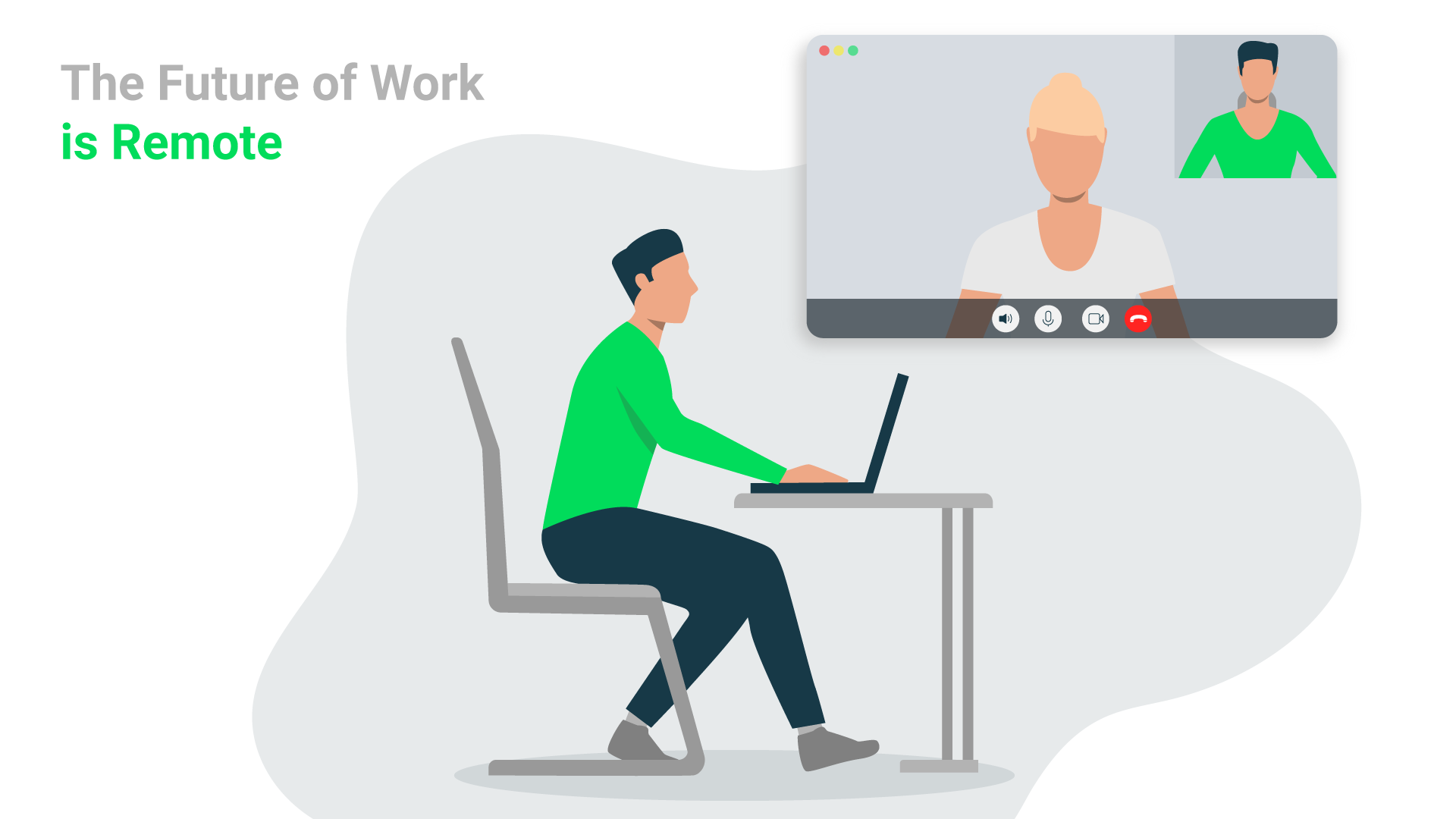Employers will need to adapt their recruitment strategy in order to attract remote and WFH talent, or they risk paying a heavy price down the road.

I work with some of the largest employers in the world, and got a front-row seat for the great transformation of the last few months. Just a few months ago, many of my customers considered Work From Home an impractical, if not totally impossible option for its line of work. The economics appeared to be set in stone as many of them were keen to show their shareholders a positive return on the significant investments made in office space and real estate. Then came the pandemic crisis, and everything changed. Very quickly companies realized that they had to adapt to the new normal or lose significant market share. And adapt they did. In the past few weeks, we have seen some of the largest employers in the world activate large WFH programs, even in geographies where it was considered hard or impossible to do.*
The quick wins from shifting to remote work caught a lot of them by surprise (“wow, this actually works”), so much so that many of them have decided to embrace this new mode of work as their default mode. Indeed, the benefits of shifting to a remote-first culture are immediate and undeniable: a happier workforce, less commuting time and less overhead. In hindsight, it seems silly to have waited this long.
As companies shift to hiring remote workers, it is not enough to revise their internal policies and collaboration tools, they definitely need to rethink who they hire. The candidates who are qualified to perform well in a remote environment are different than the ones that perform well in an office environment and recognizing how that will affect the talent acquisition strategy early on makes all the difference in making a smooth transition.
From local to global: a funnel so large you can't quite visualize it
 The immediate benefit to shifting to a remote first culture is obvious: the size of your talent pool will grow exponentially.. You are expanding your talent pool by a factor of 10-50x by going from local to a nationwide search, and by up to 1,000x by going from a local to a global (“planetary”) search. Considering that most job openings are already overwhelmed with applications (an average of 100+ applications per opening), this type of expansion stretches the mind beyond its natural ability to visualize. One can easily visualize what 100 applicants look like… But try imagining 100,000 (three full football stadiums?)… At that scale, recruiters have no choice but to rethink their hiring process and do away with any remnants of a manual selection process. There is absolutely no way an employer can process that volume of data in a manual manner. The rules of the game are changed completely and definitively.
The immediate benefit to shifting to a remote first culture is obvious: the size of your talent pool will grow exponentially.. You are expanding your talent pool by a factor of 10-50x by going from local to a nationwide search, and by up to 1,000x by going from a local to a global (“planetary”) search. Considering that most job openings are already overwhelmed with applications (an average of 100+ applications per opening), this type of expansion stretches the mind beyond its natural ability to visualize. One can easily visualize what 100 applicants look like… But try imagining 100,000 (three full football stadiums?)… At that scale, recruiters have no choice but to rethink their hiring process and do away with any remnants of a manual selection process. There is absolutely no way an employer can process that volume of data in a manual manner. The rules of the game are changed completely and definitively.
Different ranges of remote: at Talkpush, we have a remote policy which allows us to hire people in different geographical “ranges” depending on the position. For Graduate hires and Business Development Representatives, we consider that meeting on a regular (weekly or more) basis is required, hence we hire within the range of a city. On the other hand of the spectrum are the product and engineering team, where we do not ever need physical presence in the office, hence we can broaden our search to anyone on planet Earth!
With more volume, automation becomes unavoidable
 As your funnel opens up, volumes will increase dramatically and unable to get back to everyone, you risk sending your candidates to a deafening black hole of silence. It’s no fun being an active job seeker, and it's even less fun if you don’t hear back from employers. Lack of or slow response is regularly ranked the number 1 or number 2 frustration from candidates. Your first responsibility as an employer is to protect your employer brand by treating every candidate with respect and decency. That starts with getting back to them after they have taken the time to send you an application. As stated above, it is impossible to get back to every candidate manually if you are expecting a high volume of candidates, which is the very likely outcome you will get from expanding your search from local to global. Hence, you will not be able to delay the automation of candidate engagement any longer. Now is the time to make that investment.
As your funnel opens up, volumes will increase dramatically and unable to get back to everyone, you risk sending your candidates to a deafening black hole of silence. It’s no fun being an active job seeker, and it's even less fun if you don’t hear back from employers. Lack of or slow response is regularly ranked the number 1 or number 2 frustration from candidates. Your first responsibility as an employer is to protect your employer brand by treating every candidate with respect and decency. That starts with getting back to them after they have taken the time to send you an application. As stated above, it is impossible to get back to every candidate manually if you are expecting a high volume of candidates, which is the very likely outcome you will get from expanding your search from local to global. Hence, you will not be able to delay the automation of candidate engagement any longer. Now is the time to make that investment.
The good news is that this is more of an investment in time than a major expense. There are dozens (hundreds?) of pre-screening and interviewing methods such as asynchronous videos interviews, online assessments, pre-screening tests, available in the market, many of which cost just a few hundred dollars a month. The hard part? Making each of these screening steps happen in sequence, without human intervention, which requires a bit of system integration. This is work that most recruiters dislike doing, so you might need to bring them some third party help, in the form of a digital transformation project manager or a tech vendor which is willing to go the extra mile. You are also advised to work with vendors who make it easy to integrate with others, preferably with an open-access API (some vendors actually charge for those) and of course, who offer good documentation.
Recruitment Hack: the group video interview
Struggling to handle an increased volume of candidates? Keen to give each of the qualified candidates a quality pitch about the company and the job but running out of recruiters to deliver that in a timely manner? One “hack” is to organize daily group interviews which are more about a recruiter selling the company, and answering questions from the audience. While the main purpose of these sessions should be to get the candidates motivated, it can also be the basis to evaluate to see how candidates behave in a group environment, and whether they are receptive to your company’s work practices: ask candidates to switch on their camera and watch out for those who rolls their eyes when they disagree.
WFH requires people with a different mindset
In recent weeks, Continuum, a Business Process Outsourcing firm which employs over 18,000 associates, turned its whole operation on its heels in favor of remote work. Elaine Davis, CHRO at Continuum explained how they had to rethink the type of talent they wanted to attract:
“We used the crisis to go back to our customers to say we’re a work-at-home company now. And everything we do from now to the foreseeable future (...), is making that work-at-home model more robust. We're going to change how we hire and who we hire. Now we're looking for people who are perfectly happy to work at home, as opposed to people that are doing it because they have to.”
Elaine Davis, CHRO, Continuum
Indeed, even though it seems like the whole world went remote, many of the employees working from their home offices can’t wait to get back to their workplace office. If you’re making the switch to remote work for the foreseeable future, you’ll need to find people that enjoy and perform well in remote work in the long run. As with everything else, the art of working remotely is something which is trained and learned, rarely innate, and you would be well advised to hire professionals who have already worked in this model before. By now, a fair share of the general population has had SOME experience with remote work, so you can just ask them how remote work felt for them, and more practically how they have created good working conditions at thome. If they do not have a dedicated workspace, this is usually a red flag.
You can also find millions of experienced remote workers in marketplaces like Upwork, Freelancer, or Fiverr. Getting them to commit to a more full-time commitment might be tricky, but many will enjoy the stable income - and the occasional gig work they may get as supplemental income may not necessarily affect their work performance.
Kim Howell, Chief People Officer at ERC, witnessed a shift in WFH applicant profiles.
“The profile of a WFH agent in the past was typically second or third career choice, usually 40 or older, stay at home parents or second jobs, 70% of them were part time and 30% full time. Now we’re seeing a big shift 57% of our applicants applying for full time work WFH.”
Kim Howell, Chief People Officer, ERC
Redefining the workplace as a community, not a place people go to
.jpg?width=1920&name=iv3%20(1).jpg) To attract these remote savvy employees, you may need to adapt your employer marketing, and shift the narrative from “look at our beautiful offices” to “look at our community”. Employers wanting to attract remote workers will need to emphasize the shared values of their employees and how they align to their grand vision to change the world. Your employer brand also needs to reflect your remote ambitions. Experienced remote workers understand that working from home is easier said than done, and that it requires rigorous procedures around task assignment, internal communication, collaboration, and a culture of transparency failing of which the productivity and trust will start to suffer immediately.
To attract these remote savvy employees, you may need to adapt your employer marketing, and shift the narrative from “look at our beautiful offices” to “look at our community”. Employers wanting to attract remote workers will need to emphasize the shared values of their employees and how they align to their grand vision to change the world. Your employer brand also needs to reflect your remote ambitions. Experienced remote workers understand that working from home is easier said than done, and that it requires rigorous procedures around task assignment, internal communication, collaboration, and a culture of transparency failing of which the productivity and trust will start to suffer immediately.
Social media is the best channel to talk about the unique culture you have fostered, and get candidates excited about being part of a community which is strong in spite of the physical distance that separates them. Social media can be used to advertise to active job seekers (through Facebook Jobs and Linkedin) as well as passive talent, by showing how cool you are. Employer brand initiatives are based on visual content focused on company culture.
There is plenty of content that can reinforce the feeling of a strong community at your company, here are a few examples for inspiration:
-
Showcase the online events you have organized or participated in (e.g. see our own Events page)
-
Screen capture with group meetings over Zooms
-
Pics from team-building events, like the #watercoolerchat pics we've posted on Instagram.
-
Video job descriptions
-
Employees with their pets
-
Charade competition videos
-
Lip Sync competitions
-
Remote lunches or cocktail hours
In a word: any content that shows that people can still have fun together when physically separated. You can also share your company's policies around remote work. All of these elements combine to tell candidates an important story about your company values and help you attract the right talent.
Can they be productive at home?
Part of the screening process for remote workers needs to include accessibility, and how realistic it is for the candidate to perform all of their necessary tasks from home. Various methodologies can support that evaluation:
-
A quiet dedicated environment: Employers are asking candidates to send short videos of their workspace: what does your office look like, does it have a dedicated space, or is the candidate planning to work from a busy living room?
-
Strong connectivity. A good broadband internet access is usually a prerequisite to get remote work done. There are various ways to capture that:
-
Some recruitment software will allow you to capture the internet speed from which the candidates are applying (though that will require them to ask candidates to apply through their Wifi, not their mobile connection, which could affect your conversion rate).
-
Alternatively, you can ask the candidate to send you a screenshot of their internet speed performance.
-
Video calls can be a reliable indicator of Internet performance
-
Screen for the right people: Successful remote employees are autonomous, organized, mature, and transparent. These are all essential values for a remote team to reach their goals. Include personality assessments that can screen for these qualities, and take a look at other indicators like past jobs and accomplishments.
While the above holds true, the world has also become more understanding on the realities of work from home, and while certain background noises may have been considered unprofessional just a few months ago, they are now much more common. Barbara Robles, Talent Acquisition Deputy Director, from Grupo Posadas, one of the largest hotel chains in Latin America, which moved a significant portion of its staff to remote speaks about the cultural adaptation

“We did a complete 180. Now people understand that a baby might start crying in the background.”
Bárbara Robles, Talent Acquisition Deputy Director, Grupo Posadas
-> For remote productivity tips check out these 9 pieces of advice we collected from talkpushers.
An opportunity to be more demanding on culture-fit
For many companies, the very real, very physical boundaries that used to bring employees together have fallen down. If location is no longer a factor, then what will be the new criteria to decide who’s in and who’s out? Is this a chance to raise the bar on the cultural fit within your company? Is part of your cultural heritage embedded in the location of your business (e.g. a company based in Atlanta may pride itself on its “southern hospitality”, a company based in New York might celebrate its thick-skinned, straight-shooting staff, etc.)? If those are attributes that you wish to preserve in spite of a broader geographical search, you may want to rethink your pre-screening questions (e.g. if you want to test someone’s “southern hospitality”, you could ask him to role-play welcoming a guest in a hotel).
When my company expanded our internal talent search from a local to a global scale, we saw an increase in the volume of applicants. This meant we could be a little more demanding on certain aspects, such as company culture fit. While we may have been less scrupulous about a strict adherence to certain values before, we can now afford to be more picky and we’ve therefore added more “soft skills” questions, such as this one, which we stole from Peter Thiel: “What belief do you hold true, that the majority of their peers don’t?” This interview question helps us eliminate group thinkers.
Building a united nations of employees
If, like many employers, you decide to start sourcing talent nationwide, or worldwide, you will have to deal with a much greater cultural diversity than before. While this is ideologically sound, it will potentially create new challenges and conflicts within the team. Your new expanded community will be looking for guidance on what is acceptable communication behavior, and what is not. More than ever, team building, empathy and communication training will need to be a core part of the onboarding process.
The opportunity of a lifetime
Employers will look back at 2020 as a defining time in their talent strategy, a once-in-a-lifetime opportunity to redefine their ideal candidate profile, rethink their process, and build a company which attracts the best talent regardless of location. This is the next step in the century-long process of globalization and free trade, which has brought prosperity to humanity. For individuals living outside of a large metropolis, this opens a world of career opportunities. They will no longer be defined by where they grew up or where they live, but by their talent and work output. In a world which is screaming for fairness and opportunity, the remoting hiring revolution may be just the solution we’ve all been waiting for.
About Talkpush
Talkpush is the new way employers and candidates connect all over the world. We believe hiring is about starting conversations; and are on a mission to level up the recruitment experience.
The company was founded in 2014, and like most companies started with physical offices, and everyone in a single office, in a single country. In 2016, we started hiring in the Philippines, In 2017 in Costa Rica, in 2018 in Mexico, still with offices... Gradually, we started experimenting with hiring in countries where we do not we have physical offices. It worked. By the time the Coronavirus crisis hit, Talkpush was employing over 60 "Talkpushers", located in more than 8 countries, and they spend an average of 20/30% of their time in the "office". Talkpush offers a co-working allowance to anyone who wishes to work in a location close to their home. This hybrid model shifted to fully remote as a response to the pandemic. Some Talkpushers are now coming back to the office, at their discretion.
* just to name a few, we’ve noticed large scale WFH hiring programs from Teleperformance, Sitel, TTEC, Kelly Services, United Health group Aerotek, Alight Solutions, Amazon, Cisco, CVS Health, Dell, EXL, Fiserv, Gartner, Johnson & Johnson, JPMorgan Chase, Novartis, Philips, Robert Half International, Sutherland, Williams-Sonoma, Oracle, HCL Technologies, Sodexo, Cognizant, Intel, Tech Mahindra. Mphasis, WNS, Pearsons, Hilton, Wells Fargo, NTT Group, ADP, Xerox, VMware, Randstad, Adobe, Anthem, Concentrix, Accenture, The Hartford; AXA, Capital One, Adecco, Tesco, Conduent, IBM, Telus
👉 What do you think? Are you ready to go remote? Schedule a call with us and find out how Talkpush can help you find and hire qualified remote experts.




